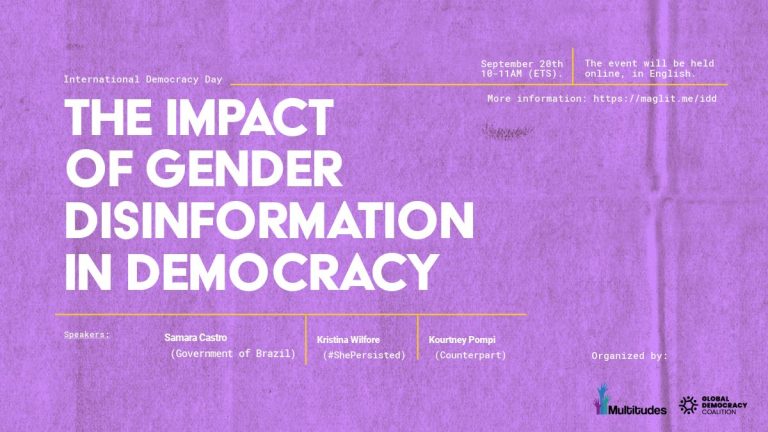Date: September 20 from 10AM to 11AM EST
Location: Virtual
Host: Fundación Multitudes
Panel – “The Impact of Gender Disinformation in Democracy”
International Day of Democracy has been celebrated annually on September 15th since its establishment by the UN General Assembly in 2007. This day provides an opportunity to assess the state of democracy worldwide. Democracy comes from the Greek words “demos,” meaning people, and “Kratos,” meaning power, defining it as the people’s power. At its core, democracy relies on active citizen participation and protecting their rights, as it is fundamentally a system by and for the people. Democracy is strengthened by promoting and protecting human rights, development, peace, and security.
While we acknowledge the importance and value of democracy, we must also recognize the growing threats it faces. In recent years, democracy has been increasingly under attack. This is not only due to those in power misusing their positions to advance personal agendas, but also because of other actors such as insurgent forces, sensationalist media, and authoritarian regimes. These actions have deepened public distrust and undermined democratic institutions. Furthermore, we now live in a technological era, which has further complicated the issue by amplifying disinformation and manipulation, making it more challenging to safeguard democratic principles.
These threats have disproportionately impacted minority populations, including women. A study by Fundación Multitudes found that 93.5% of Chilean women parliamentarians surveyed had been targeted by disinformation, and 96.8% reported experiencing disinformation as a form of gender-based violence (2023). This highlights that attacks towards women are often rooted in their gender, making them specific targets of such harmful actions.
At Fundación Multitudes, we are dedicated to promoting gender equality in politics. We have led programs to empower women-led civil society organizations to combat gender-based disinformation and violence. By strengthening the capacities of these organizations, we aim to contribute to a more inclusive and equitable political landscape.
Our research at Fundación Multitudes has identified several aspects in which disinformation erodes democracy and decreases women’s political participation. To address these challenges, and under the framework of International Democracy Day, we are partnering with the Global Democracy Coalition (GDC) to organize a panel discussion on the “Impact of Gender Disinformation on Democracy.”
The GDC is an ideal partner for this initiative, given its leadership in promoting democratic values worldwide through a network of 120 organizations committed to this cause. Given the growing global challenges to democracy, particularly those affecting youth and women, it is essential to reinforce democratic engagement through inclusive and participatory events.
The primary objective of the event is to promote democratic values by engaging a broad range of stakeholders, including government officials, civil society organizations, youth leaders, and international partners. The event aims to:
- Enhance democratic participation by focusing on youth and women, encouraging their active involvement in democratic processes.
- Foster cross-regional dialogue to share experiences and best practices in advancing democracy.
- Highlight the role of civil society in supporting democratic resilience, particularly in conflict zones.
- Address the impact of disinformation on democratic engagement, particularly gendered disinformation affecting women in politics and activism.
The event will be structured as an online panel featuring:
- Panel Discussions on the impact of disinformation on youth and women’s participation, the state of democracy, and civil society’s role. The panel will feature influential voices with extensive background in this field.
- Networking for participants to connect, share ideas, and build collaborations.
During and after the panel discussion, we aim to achieve the following outcomes:
- Increased awareness and engagement on the challenges and opportunities for youth and women in democracy.
- Strengthened networks among civil society organizations and other stakeholders across regions.
- Concrete strategies and recommendations to combat disinformation and enhance democratic resilience.
Ensuring a rich dialogue that raises awareness and informs about the impact of disinformation on women and democracy. Our speakers include:
- Samara Castro – a lawyer specializing in the areas of Electoral and Party Law, Digital Law, Privacy, and Data Protection. She currently serves as the Vice-President of the Data Protection and Privacy Commission of OAB-RJ and a member of the Electoral Law Commission of the Brazilian Academy of Electoral and Political Law (ABRADEP).
- Kristina Wilfore is the co-founder of #ShePresisted, Director of Global Innovation and Projects at Reset, and advisor to the Global Alliance for Action Against Gender-Based Online Harassment and Abuse.
- Kourtney Pompi is the senior director of governance at Counterpart and co-chairs the Democracy, Rights, and Governance Workgroup at the Society for International Development. With extensive experience in program management and design, her expertise includes citizen engagement, electoral participation, peacebuilding, and inclusive development.
For the panel, we would like our experts to explore not only how and why gendered disinformation poses a threat to democracy but also to draw from their own experiences, research, publications, and projects. Key themes to be discussed include:
- The erosion of trust in democratic institutions
- The reduction in women’s political participation caused by gendered disinformation
- The weakening of electoral integrity by disinformation campaigns and foreign influence
- The disempowerment of vulnerable groups through disinformation campaigns
- The Impact of women on policy-making
- How disinformation fosters political instability
We would also like the panel to include a focus on Latin America as a case study. Fundación Multitudes, through its Women´s Observatory Against Disinformation and Fake News, has observed that the Global South is often underrepresented in discussions and dialogues about these issues, and it is crucial to highlight perspectives from the region.
Agenda:
| Time Frame | Activity | Additional Information |
| 9:50 to 10:00 | Reception of attendees and panellists | We will ask our panellists to join Zoom 10 minutes before the event starts to check the technical aspects. We will let attendees enter 5 minutes before the event starts. |
| 10:00 to 10:03 | Welcome and introduction of topic and speakers [moderator] | The moderator will introduce the session and speakers briefly for 3 minutes. |
| 10:03 to 10:21 | Speakers will respond to the introduction question (3 min to introduce the question, 5 minutes to answer) | Each speaker will have 5 minutes to kick off the conversation and reply to the question addressed by the moderator in a Davos format. The Moderator will have 3 minutes to make the introduction question. The suggested order to speak in this session will be the following: ➔ Samara Castro (5 min) ➔ Kristina Wilfore (5 min) ➔ Kourtney Pompi (5 min) |
| 10:21 to 10:25 | Moderator comments and questions to speakers | The moderator provides remarks on the responses and chooses one question for the speakers, which can be individual or in pairs. |
| 10:25 to 10:30 | 1st Speaker response | The speaker responds to the moderator’s question. The moderator thanks the speaker and then asks another speaker a question. |
| 10:30 to 10:35 | 2nd Speaker response | The speaker responds to the moderator’s question. The moderator thanks the speaker and then poses a question to another speaker. |
| 10:35 to 10:40 | 3rd Speaker response | The speaker responds to the moderator’s question. The moderator thanks the speaker and then poses a question to another speaker. |
| 10:40 to 10:42 | Moderator asks for closing remarks | The moderator asks the speakers to conclude their intervention with a final reflection and recommendations. |
| 10:42 to 10:44 | 1st Speaker’s final remarks | The speaker will end their intervention with a reflection or recommendation. |
| 10:44 to 10:46 | 2nd Speaker’s final remarks | The speaker will end their intervention with a reflection or recommendation. |
| 10:46 to 10:48 | 3rd Speaker’s final remarks | The speaker will end their intervention with a reflection or recommendation. |
| 10:48 to 10:50 | Concluding remarks | The moderator will briefly summarize the discussions and close the session in 2 minutes. |
| 10:50 to 11:00 | Q&A Session | The audience can send in questions through the chat. Two to three questions will be chosen for the speakers to answer shortly. |
Guide questions:
Kristina Wilfore
- #Shepersisted published a report on gender disinformation Big Tech and The Weaponization of Misogyny in the Brazil Online Ecosystem, which provides an assessment of the size and scope of the problem of digital threats to women in public life in Brazil: What steps do you believe should be taken to create a more inclusive and free-from-gender-based-violence public discourse and decision-making process?
- Can you tell us how much of that threat is related to gender misinformation in Brazil, and is this threat also visible in other LAC countries?
- And in your research, what can you tell us about the impact of gender disinformation on women’s environmental and human rights defenders?
Samara Castro
- Your expertise in electoral and digital law, coupled with your experience in managing crisis situations in virtual environments, puts you in a unique position to understand the challenges of combating disinformation.
- How do you see the role of legal frameworks in and governments in protecting women from online threats in Latin America?
- How do you see the role of intergovernmental collaboration in combating sexist disinformation?
Kourtney Pompi
- Given your extensive experience working with several international and domestic election observer groups to monitor elections abroad, as well as your role as an election official in the United States.
- What role do foreign influences play in perpetuating disinformation campaigns during elections against women candidates in the Global South?
- How has gendered disinformation threatened democracy, civic spaces, and electoral processes? How can these threats be countered and/or mitigated?
General questions:
- How can governments, the private sector, and civil society better support and protect women from gender-based disinformation and hate campaigns?
- What steps do you believe should be taken to create a more inclusive and free-from-gender-based-violence public discourse and decision-making process?


